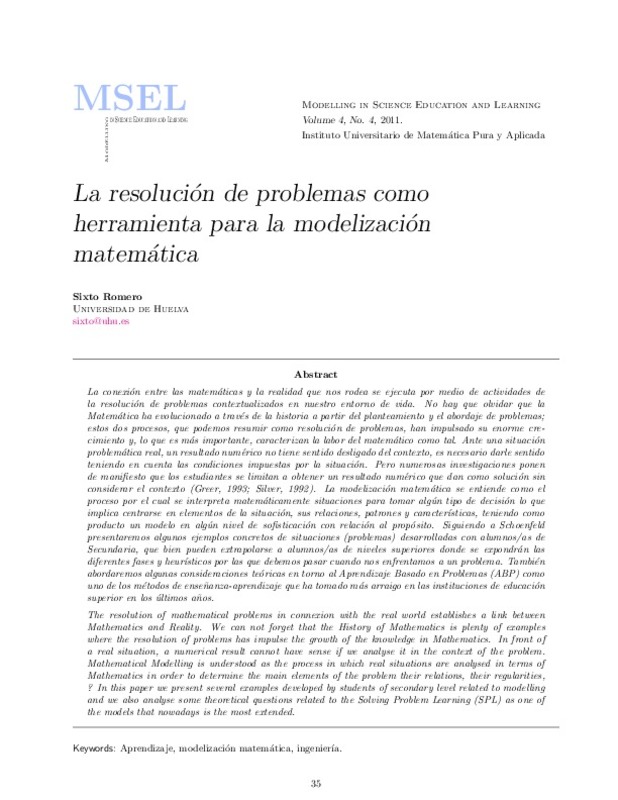|
[EN] The resolution of mathematical problems in connexion with the real world establishes a link between Mathematics and Reality. We can not forget that the History of Mathematics is plenty of examples where the resolution ...[+]
[EN] The resolution of mathematical problems in connexion with the real world establishes a link between Mathematics and Reality. We can not forget that the History of Mathematics is plenty of examples where the resolution of problems has impulse the growth of the knowledge in Mathematics. In front of a real situation, a numerical result cannot have sense if we analyse it in the context of the problem. Mathematical Modelling is understood as the process in which real situations are analysed in terms of Mathematics in order to determine the main elements of the problem their relations, their regularities. In this paper we present several examples developed by students of secondary level related to modelling and we also analyse some theoretical questions related to the Solving Problem Learning (SPL) as one of the models that nowadays is the most extended.
[-]
[ES] La conexión entre las matemáticas y la realidad que nos rodea se ejecuta por medio de actividades de la resolución de problemas contextualizados en nuestro entorno de vida. No hay que olvidar que la Matemática ha ...[+]
[ES] La conexión entre las matemáticas y la realidad que nos rodea se ejecuta por medio de actividades de la resolución de problemas contextualizados en nuestro entorno de vida. No hay que olvidar que la Matemática ha evolucionado a través de la historia a partir del planteamiento y el abordaje de problemas; estos dos procesos, que podemos resumir como resolución de problemas, han impulsado su enorme crecimiento y, lo que es más importante, caracterizan la labor del matemático como tal. Ante una situación problemática real, un resultado numérico no tiene sentido desligado del contexto, es necesario darle sentido teniendo en cuenta las condiciones impuestas por la situación. Pero numerosas investigaciones ponen de manifiesto que los estudiantes se limitan a obtener un resultado numérico que dan como solución sin considerar el contexto (Greer, 1993; Silver, 1992). La modelización matemática se entiende como el proceso por el cual se interpreta matemáticamente situaciones para tomar algún tipo de decisión lo que implica centrarse en elementos de la situación, sus relaciones, patrones y características, teniendo como producto un modelo en algún nivel de sofisticación con relación al propósito. Siguiendo a Schoenfeld presentaremos algunos ejemplos concretos de situaciones (problemas) desarrolladas con alumnos/as de Secundaria, que bien pueden extrapolarse a alumnos/as de niveles superiores donde se expondrán las diferentes fases y heurísticos por las que debemos pasar cuando nos enfrentamos a un problema. También abordaremos algunas consideraciones teóricas en torno al Aprendizaje Basado en Problemas (ABP) como uno de los métodos de enseñanza-aprendizaje que ha tomado más arraigo en las instituciones de educación superior en los últimos años.
[-]
|








